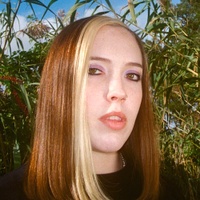On keeping the work fresh
Prelude
flipturn’s rise didn’t happen overnight. From house shows in Florida to major festivals like Bonnaroo and Lollapalooza, the band built their reputation through relentless touring and emotional, immersive indie rock. Their 2022 debut album Shadowglow expanded their fanbase and took them to iconic stages like Red Rocks, but also pushed them to the edge. Channeling that burnout into art, flipturn created Burnout Days—a collaborative, cathartic follow-up written in the North Carolina mountains and recorded in the Texas desert.
Conversation
On keeping the work fresh
Musicians flipturn discuss the best ways to avoid burnout, set boundaries with work, and keep the art feeling meaningful.
As told to Sarah John, 1820 words.
Tags: Music, Collaboration, Inspiration, Mental health.
My first question is for you, Dillon. “Sunlight” is a really personal track. You talk about your mother and her experience with rehab. You were really vulnerable in that song. You said in an interview that as an artist, you’re vulnerable for a living. How do you decide what the line is—what to protect and what to share?
Dillon Basse (vocalist): Since I have been writing most of the lyrics for the band since we started, it’s always been an inner battle of: how do I write about what’s inspiring me personally and get the best lyrics, but also try to tell a story that everybody in the band or… That can relate to people, and it’s not just about me?
“Sunlight” was probably the closest I’ve come to crossing that line. I think everybody realizes it’s personal because there are so many specific names that I’ve put into the song. I actually was inspired by Adrianne Lenker and Big Thief. There are multiple songs where she namedrops, or she puts out certain names. I always think that’s really cool, because I have no idea who those characters are in her songs. I put certain faces and people in my life in that same position.
So, if you know me and know my family, you’re going to know. But if you don’t, I was hoping that people would have that same kind of relationship with the names. “Sunlight” is very specific, but it’s really only if you know me. If you don’t, then I’m hoping that that can speak for whoever is in your life, or whatnot. That was my intention.
No, that makes a lot of sense. It’s personal to a degree, but it can still speak to a larger experience and not be so explicit.
Dillon: Right.
Okay. My next question is for you, Madeline. Would you say you guys have any creative rituals or routines?
Madeline Jarman (bassist): Yeah. I’d say, honestly, before a show we’re all pretty zen. I think we all kind of preserve a lot of energy for our live show. It’s like, Dillon’s making a cup of tea, we’re just kind of doing deep breaths, and we do a little huddle before each show to create that similar headspace of being present and in the moment. At least, on tours, it’s like that. At home, I think we all like to live a pretty slow lifestyle, since on tour, it’s just very go, go, go. We’re experiencing so much stuff. Yeah, taking it slow. I think that’s kind of ritualistic for us.
Dillon, when you guys are writing a song, do you have a specific feeling you hope to leave the audience with? Or is it more just like self-expression? Do you go in with like, “This is the message I’m trying to send to people?”
Dillon: Sometimes, I have a whole notes app of just either lyrics, phrases, or themes. But most of the time, writing is me just trying to figure something out. Like if I am truly questioning something, or if something’s going on in my life or in our lives.
I’m not going to write and tell people like, “This is how to do it.” It’s mostly me just being like, “I don’t know. These are my thoughts. This is how I feel about the situation.” If people relate to that then, that’s amazing. If they don’t, then, that’s also okay.
It’s more surprising or amazing when somebody comes to me and is like, “Oh, I really related to this lyric.” That’s always like, “Oh cool, so I’m not alone.” I’m not really writing so that people don’t feel alone. It’s almost the other way around.
So, there’s never a message that I’m like, “Here you go.” Other than maybe like “Take care of yourself mentally.” That’s the one that I push the most, is just really focus on your mental health. On this album the message is, “Focus on like, ‘Why are you here?’ You’re not here to work yourself to the bone until you die. Try to find the small things in life, and try to surround yourself with people that care about you and that you care about.” I think that’s the main theme I’m trying to push, I guess.
There’s a really great James Baldwin quote… I don’t want to butcher it, but he’s basically like all great writing starts with a question. You know? So, I think that’s an interesting perspective as well.
Dillon: Yeah, I like that. That’s true. Yeah.
Madeline, you kind of touched on it earlier. But how do you guys avoid burnout?
Madeline: I think taking a separation from music and playing in a way. Not for too long, obviously. But we give ourselves maybe a week to just be potatoes and loaf, and not worry about playing songs, not worry about our jobs, or whatever.
Then, I think we start to feel a bit more creative again and ready to start writing. And I know all of us now, we’re itching to start writing more music even though the record just came out.
So, I think creating that space is a healthy way to sort of avoid burnout. Because it can be so bad. But we’re pretty good at keeping our heads on our shoulders. I think we respect this game so much, we know we have to keep grinding, just kind of stay afloat. I don’t know. Dillon, you might need to help me out here.
Dillon: No, I mean, I think you’re spot on. It really is just like, your hobbies when you’re home. For instance, my uncle was a really good baseball player in high school, and he got drafted to the Red Sox. But my grandfather made sure that when he wasn’t playing baseball, he wasn’t doing anything baseball-related. It was all like, “We’re going hiking, we’re going to go on a trip, or we’ll play another sport.” Just something not baseball-related. I think that’s why my uncle ended up progressing so much, and became such a good baseball player. Because he had his time away from it, so that he still loved it when he came back to it and was still passionate about it.
That’s one story I keep coming back to. Like, in your off time, try to find something, like hobbies. Something completely not related, to keep it fresh, I guess.
It sounds like you guys are really careful about having structured time that’s devoted to other things. Then, also, thinking of this in the long term, as like a long game. That sounds like a good system. You touched on this earlier, Dillon, but I wanted to ask in general like, what role art plays in your emotional processing? Like, what do you go to art for, to understand?
Dillon: Yeah. I think I go to art for inspiration, sometimes. It can be through music. But when I feel the most inspired has also been after I’ve seen a really good film or theater production. Like coming out of a room in that way where you’re like, “Holy crap.” It’s all about a certain feeling. I guess I come back to the things that I think will inspire me when I’m needing that feeling, like that there’s something bigger than me.
Are there any other common themes in pieces of art that you feel are really good, you think? I know this is a very broad, vague question, but what makes a piece of art really good to you, in general?
Dillon: I really like anything that tackles somebody else’s point of view. Aside from being firsthand in certain situations, like in a different country, I think art is the next best way to actually see what life is like and get a different point of view rather than something that you’ve been brought up with. We all have our little bubbles.
I think that some of my favorite stuff has come from witnessing art that’s really good at telling somebody’s point of view that, maybe, I’d never thought about before.
This is for both of you, in whatever order you prefer. But what’s been the most meaningful part of being an artist so far?
Madeline: For me, the most meaningful part is definitely when we’re able to meet our fans. It means a lot to hear people’s stories, and like what a certain song can mean to them. Dillon kind of talked about it earlier. A song of ours can mean something to us, but it can mean something completely different to someone else. I think that’s my favorite thing, too, is just hearing different perspectives of a song.
Dillon: Yeah, I think the same thing, basically what Mad said. Going out and actually meeting the people, and the exchange of energy when we’re on stage—especially when you look out and people are like singing these words back to you— is like, “Damn, that’s really cool.” So, I think that’s my favorite part, is just meeting them and seeing everybody that listens to our music.
Is there a specific moment for each of you that you think really embodies that? Do you have a memory, like a favorite memory or a favorite moment you wish you could relive?
Dillon: I think this isn’t the craziest thing… I’m sure there are other moments that we’ve had, but the most recent one I can think of is when we were in Germany, and they were singing the words back to us in a German accent. You’re just like, “Oh my god, how the hell did this reach Germany?” Like, this is a completely different country. This is nuts.
Madeline: Yeah, I definitely agree with that. Last year, we put on our own music festival called Playgrounds in Gainesville, where a couple of us went to college. Gainesville is a special city to us. So, we hold our festival there.
Last year, a family flew all the way from Ireland to Gainesville, Florida, which is a tiny town. They flew all the way there to see us play, and we got to meet them and talk to them. So, that was super just insane. I’ll always remember that.
It’s like a good reminder that art kind of transcends those borders. Do you guys have any final thoughts, words, notes?
Dillon: We always have to say, come see us live. We’re about to go on tour. So, come see the show live, come see the new stuff live. That’s my last thought.
flipturn recommends:
Sparkling Americano
Star Wars Battlefront II for XBox (2005)
Tupperware™ containers
Arcane (show)
The Last of Us, Season 2 (It’s not out yet but we just know it’s gonna be good)
- Name
- flipturn
- Vocation
- musicians
Some Things
Pagination



